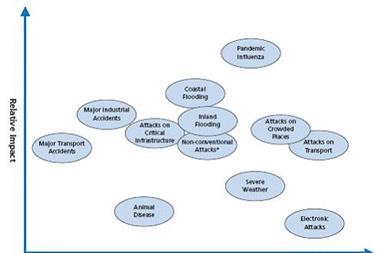The Cabinet Office has released the first ever national risk register which outlines the most significant threats to the UK and its citizens
In an age where there seem to be so many different kinds of threat, risk managers could find prioritising and planning for them rather daunting.
The UK’s Cabinet Office has just released a national risk register which sets out the likelihood and potential impact of a range of different risks that may directly affect the UK.
Information on these risks was previously held confidential within the government.
A flu pandemic was rated the threat that would have the biggest impact on the UK.
The World Health Organisation estimates that between two and seven million people could die as a result of a global epidemic on the scale of the 1918 Spanish influenza outbreak.
Experts agree that there is a high probability of another influenza pandemic occurring. Individual organisations are likely to suffer from absenteeism said the register, which warned that up to half of the UK population could become infected and 750,000 of them could die.
Although there have been 30 new infections detected around the world in the last 25 years. The likelihood of a new disease like SARS spreading to the UK is low, suggested the report.
The government’s counter measures to influenza include stockpiling vaccines, a stockpile of vaccine to treat up to 25% of the population in the event of a flu pandemic is already in place. A pandemic specific vaccine, however, would not be available for up to six months after a pandemic has started.
The list of the most significant emergencies which the UK could face over the next five years also included severe weather, infectious disease, major industrial accidents, or malicious attacks on critical infrastructure.
“The UK faces a serious and sustained threat from terrorism...some form of attack is highly likely.
The government’s risk register said: ‘The UK faces a serious and sustained threat from terrorism…some form of attack is highly likely.’
The type of malicious attack could include novel methods such as electronic attacks, the government warned. ‘Foreign intelligence organisations are attempting to penetrate computer networks through the internet,’ it said.
Government computer systems storing confidential data, as well as commercially-sensitive information held by private companies, are under constant attack from well resourced and sophisticated hackers.
Plots to destroy critical infrastructure necessary for the functioning of the country are also a threat. Attempts were made to attack electricity substations in the 1990s. In the event of a national electricity outage, the government said it would aim to restore power within three days.
The most likely target of a terrorist attack is an easily accessible crowded place with an impact beyond the loss of life alone. The government said rail transport networks were more vulnerable than airlines because of the less stringent security checks.
The government suggested UK organisations prepare business continuity plans to mitigate the risk of disruption to their operations.
For information on the business continuity standard: The business continuity standard
More on threats to the UK's security here: Britain sets out national security strategy




















No comments yet